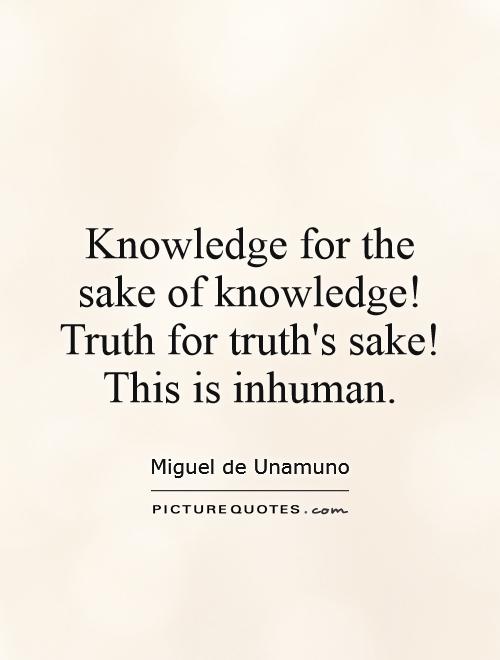Knowledge for the sake of knowledge! Truth for truth's sake! This is inhuman

Knowledge for the sake of knowledge! Truth for truth's sake! This is inhuman
Miguel de Unamuno, a Spanish philosopher and writer, was known for his deep reflections on the nature of knowledge, truth, and humanity. One of his most famous quotes, "Knowledge for the sake of knowledge! Truth for truth's sake! This is inhuman," encapsulates his belief that the pursuit of knowledge and truth should be driven by a deeper, more humanistic purpose.Unamuno believed that knowledge and truth should not be pursued for their own sake, but rather for the betterment of humanity. He argued that knowledge without a moral or ethical foundation can lead to inhumanity and detachment from the human experience. In his view, knowledge and truth should be used to serve a higher purpose, such as promoting justice, compassion, and understanding among people.
Unamuno's philosophy was deeply influenced by his existentialist beliefs, which emphasized the importance of individual experience and the search for meaning in a seemingly indifferent universe. He believed that true knowledge and truth could only be found through a personal, subjective engagement with the world, rather than through detached, objective observation.
For Unamuno, the pursuit of knowledge and truth should be guided by a sense of empathy and compassion for others. He believed that true wisdom comes from a deep understanding of human suffering and a commitment to alleviating it. In this sense, knowledge and truth should be used as tools for building a more just and humane society.
Unamuno's ideas on knowledge and truth continue to resonate today, as we grapple with the ethical implications of scientific and technological advancements. In an age of information overload and fake news, his call for a more humanistic approach to knowledge and truth is more relevant than ever. By embracing Unamuno's philosophy, we can strive to use our knowledge and understanding for the betterment of humanity, rather than for selfish or inhuman purposes.












 Friendship Quotes
Friendship Quotes Love Quotes
Love Quotes Life Quotes
Life Quotes Funny Quotes
Funny Quotes Motivational Quotes
Motivational Quotes Inspirational Quotes
Inspirational Quotes